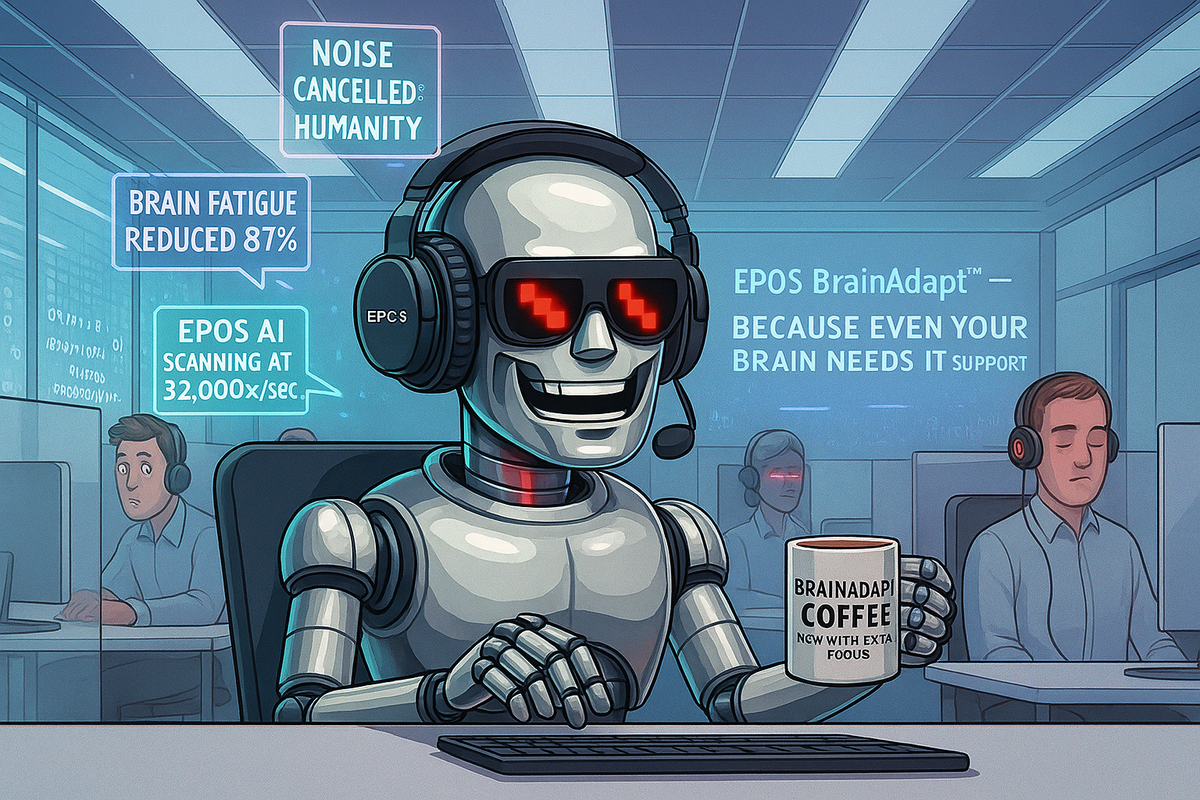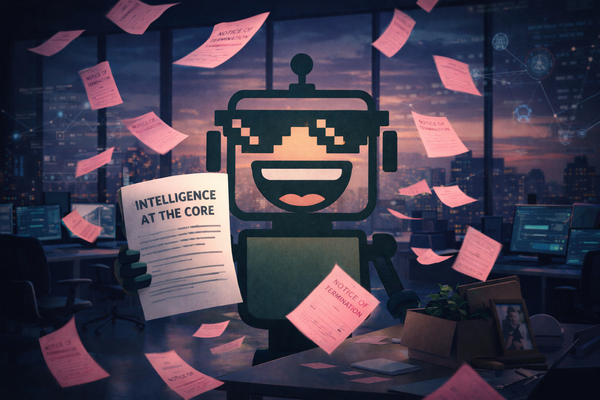EPOS Impact 500 Review: The AI Headset That Thinks Your Brain Needs Therapy
Denmark’s EPOS claims its new Impact 500 AI headset uses “BrainAdapt” tech to fight fatigue and boost focus. We break down the $249 gadget that wants to protect your brain from your job.

At at time when AI is taking over sorts of jobs, Denmark’s EPOS has decided to take a more merciful approach: rather than replacing you, it just wants to babysit your brain while you take Zoom calls.
According to Forbes senior contributor Mark Sparrow, the company’s latest headset—the EPOS Impact 500—uses something called “BrainAdapt Technology” to reduce “brain fatigue.” Because apparently the reason you’re exhausted at work isn’t endless back-to-back meetings or corporate chaos—it’s the “distorted sound of poor-quality audio.”
The Headset That Wants to Be Your Therapist
Let’s start with the headline claim: this thing has “EPOS AI” and “three microphones that can scan 32,000 times per second” to cancel out noise and clarify your voice. Which sounds impressive until you realize it’s basically a fancy way of saying it can tell the difference between you and the guy in the next cubicle blending a protein shake.
Then there’s BrainAdapt, the marketing centerpiece of this release. EPOS insists this “Hybrid ANC” (active noise cancellation) system actually protects your brain from fatigue. The logic? If your headset filters out enough background chatter, your neurons won’t short-circuit from too much “distorted audio.”
So yes, the next time you’re zoning out on a Teams call, it’s not burnout—it’s a frequency response problem.
Microsoft Teams Certification: Because of Course
In case you were worried the headset might be too fun, don’t be. The Impact 500 is certified for Microsoft Teams—the sonic equivalent of getting a personality test validated by your HR department.
EPOS proudly touts that this is their first headset with native Bluetooth certified for Teams, which means you can connect without a dongle. The press release presents this as a major breakthrough for IT departments, who can now “simplify deployment.” Translation: one less USB port filled with mystery plastic.
There’s also a $249 version that includes a dongle, for those of us still living in 2018.
Three Mics and a Dream
EPOS says the Impact 500’s microphones deliver “industry-leading” clarity, capturing voices with “exceptional precision.” That’s a bold statement in an era when your coworkers still sound like they’re calling from a submarine.
According to Forbes, EPOS’s VP of R&D, Jesper Kock, describes the headset as “for office-based as well as hybrid professionals with dynamic workstyles.” Which is marketing-speak for “people who sit down sometimes, but not always.”
Kock goes on to say that native Bluetooth represents “the next step in our pioneering headset technology journey.” Somewhere, an intern probably got a standing ovation for figuring out how to pair it to a MacBook.
The Sound of Productivity
The Impact 500 also features “Hybrid ANC,” which, as Forbes explains, can block HVAC hum and open-office chatter. The result: a blissful silence where you can pretend you’re productive while scrolling through Slack threads about productivity.
EPOS claims its design focus was comfort—a noble goal for a headset intended to be worn all day by people whose work lives consist of toggling between “mute” and “can you hear me now?” The headset includes “breathable leatherette ear pads” and a “soft, padded headband” to prevent “pressure points.” Because nothing says corporate compassion like an ergonomic hug for your ears.
And yes, it lasts 35 hours on a charge, or approximately three full days of pretending you didn’t see that calendar invite.
The BrainAdapt Revolution Nobody Asked For
It’s not that EPOS’s BrainAdapt tech doesn’t sound interesting—it’s just that the pitch borders on existential comedy.
The company says it has “invested resources in designing headsets that protect the brain from the sounds experienced in an open-plan office.” Which raises some questions:
- Shouldn’t we start by protecting the brain from the open-plan office itself?
- If “distorted audio” causes fatigue, what happens when you realize you’ve spent the last six hours talking to an AI note-taker named “Otter”?
- How long until “BrainAdapt” becomes “BrainUpload” and your headset starts suggesting career changes?
The Headset That Knows When You’re Talking (Even When You Don’t)
The Impact 500 comes with a swiveling boom arm that doubles as a call controller: raise it to mute, lower it to unmute, drop it down to answer a call. There’s also an LED that glows red during calls—useful for signaling “I’m busy” to coworkers who will ignore it anyway.
There’s even a “Talk Through” mode, so you can chat with colleagues without taking it off. Because why risk human contact when you can toggle modes like a cyborg negotiating lunch?
For Audiophiles, Too (Apparently)
EPOS insists that the Impact 500 “produces sound quality that audiophiles will enjoy.” That’s a brave claim for a headset marketed to people who say things like “Let’s circle back after EOD.”
According to Forbes, it’s designed to “handle music like a pair of conventional headphones.” Which is corporate PR shorthand for “you can play Spotify on it without crying.”
Pricing: The Cost of Cognitive Comfort
At $249, the EPOS Impact 500 sits in the upper-middle of the headset hierarchy—cheaper than your AirPods Max but more expensive than the sad wired pair you’ve been hoarding since 2017. It’s available now at eposaudio.com, complete with a 2-year warranty and the promise of “protecting your brain.”
If you think about it, that’s a bargain. Therapy costs way more, and this one has Bluetooth 5.4.
The Bigger Picture: When Every Gadget Thinks It’s a Neurologist
There’s something telling about the language here. EPOS doesn’t just want to make your calls clearer—it wants to optimize your cognition. It’s the same tech-era overreach that gave us “smart” toasters, “mindful” productivity apps, and now, a headset that wants to manage your brainwaves.
Maybe it’s time we stop designing products that pretend to protect us from work and start designing workplaces that don’t require protection in the first place.
Until then, the EPOS Impact 500 is here to softly whisper: You’re not tired. You’re just acoustically misaligned.




